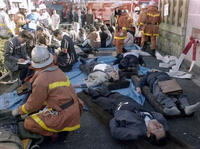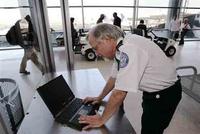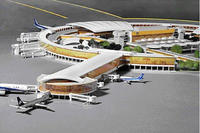-
Boston threatens to withdraw from Secure Communities
On Monday Boston mayor Thomas M. Menino announced that he will withdraw the city from the controversial Secure Communities program unless changes are made; Boston was among the first cities in the United States to test the program in 2006, but now Mayor Menino is one of the many growing voices that have taken aim at the Secure Communities program
-
-
Ground Zero mosque clears legal hurdle

Last Friday, a federal judge dismissed a lawsuit attempting to block the construction of a mosque near Ground Zero in lower Manhattan; the mosque would be built in a building which once housed the Burlington Coat Factory located two blocks from site of the World Trade Center; the mosque may have cleared its legal hurdles, but before it can begin construction the developer’s must also overcome some large financial hurdles; an estimated $100 million is needed to complete the project, and the money has not yet been raised
-
-
Five years on: Israel-Hezbollah 2006 war

Five years ago today, a war broke out between Israel and Hezbollah after Hezbollah fighters made a foray into Israel, killing several soldiers and carrying the bodies of two of them back into Lebanon; despite the uneven scale of death and damage — Israel has inflicted much more damage on Hezbollah and Lebanon — the war was initially perceived as an Israeli defeat because Israel was unable to stop Hezbollah from firing rockets into Israel during the entire conflict; more recently, though, this initial conclusion has been revised somewhat, with some analysts pointing out that the Israel-Lebanese border has been quiet during the past five years — the longest period it has been so quiet; a respected Israeli military analyst says that the 2006 war was an Israeli failure — and unless Israel changes its definition regarding who the real enemy is, the next Israel-Hezbollah war will be and Israeli failure as well
-
-
Divorce leads to approval of GPS tracking in New Jersey
A divorce case in New Jersey has resulted in the first time a state court has approved the use of GPS devices to track individuals; last week a New Jersey appellate court ruled against a man who sued his ex-wife for placing a GPS device in the car she and her husband shared
-
-
Natural enzyme can defend against terrorists' nerve agents

Chemicals called organophosphates, found in common household insecticides, can be just as harmful to people as to insects; organophosphates could be released on an industrial scale, through an act of terror or accident, attacking the nervous system by inactivating an enzyme called acetylcholinesterase (AChE); scientists are devising drugs to treat and prevent the toxic effects of organophosphates and related chemicals
-
-
Can DHS seize -- and hold for months -- U.S. citizens' laptops?

On Friday, a federal judge heard arguments in a lawsuit that challenged the government’s right to search laptops, cell phones, and other electronic devices at the border and hold them indefinitely; civil liberties groups say the policy violates a travelers’ First Amendment right to free speech and the Fourth Amendment’s protection from unreasonable search and seizure; according to the civil liberties groups, more than 6,500 travelers have been subject to such search and seizure of their electronic devices from October 2008 to June 2010
-
-
North Carolina jail investigated for immigration violations
A jail in North Carolina is currently under federal investigation on charges that local law officers mistreated detainees held as part of an immigration enforcement program; the investigation comes at the request of the state’s American Civil Liberties Union (ACLU) which requested that DHS officials investigate the Wake County jail based on fifty-seven complaints made by individuals detained there in 2009 and 2010; the complaints stem from the 287(g) program which allows local police officers to enforce federal immigration laws
-
-
Mica cuts 40 percent from House transportation spending
Last Thursday, Representative John Mica (R-Florida) unveiled the House Transportation Reauthorization bill which would allocate $230 billion to infrastructure projects over the next six years; the bill has generated fierce criticism as it would cut transportation spending for America’s roadways by nearly 40 percent
-
-
Montana floods exacerbate Exxon oil spill

Flooding in Montana has exacerbated the effects of an oil spill and made clean up more difficult for Exxon Mobil; it is estimated that roughly 750 top 1,000 barrels of crude oil have leaked into the Yellowstone River near Billings, Montana; the pipeline has been shut down, but flooding in the area has made it difficult for clean-up crews to find the source of the leak
-
-
ICE chief: Israel's inclusion on terror watch list a "mistake"

DHS officials are now saying Israel’s inclusion on a list of countries that promote, produce, or protect terrorists was a mistake; John Morton, director of the U.S. Immigration and Customs Enforcement (ICE), said, “The addition of Israel to the list—- was based on inaccurate information provided to the OIG during the course of its audit”; a May 2011 report contained an appendix which lists “specially designated countries” that promote terrorism; the list instructed ICE agents to pay special attention to, and investigate more thoroughly, individuals from these countries arrested by ICE; ICE spokesperson suggested that Israel was included not because its government supports terrorism, but because some individual Israelis do pose a terror threat; 1.5 million of Israel’s 7.5 million citizens are Arabs
-
-
Palestinian non-violent resistance will challenge Israel
In the last twenty years, the Palestinians launched two violent campaigns — intifadas — against Israeli occupation; both intifadas — the first in 1988, the second in 2000 — were forcefully suppressed by Israel; a Palestinian scholar, now teaching in the United States, has long advocated a peaceful, Gandh-like resistance as a better way for the Palestinians to achieve their national goals; he argued that the indiscriminate killing of Israeli civilians was not only a moral stain on the Palestinian national movement — it is also counter-productive, because it gave Israel reasons to respond with overwhelming force and continue to portray the Palestinians as unwilling to be partners in peace; the Palestinian leadership ignored him in the past, but appears to be listening to him now; Israel is anxious
-
-
U.S. and Kenya open talks to resume direct flights

The United States is resuming talks with Kenya to discuss the reopening of direct flights between the two countries; due to fears of terrorism from neighboring Somalia, in September 2009 U.S. officials cancelled a Delta Airlines flight just hours before the fully-booked plane was schedule to depart; the flight would have been the first direct link between the two countries since the late 1980s
-
-
ICE lists Israel among countries that promote, produce, or protect terrorists

DHS’s Immigration and Customs Enforcement (ICE) issued a report describing the methods on which the agency relies to arrest, detain, and, if necessary, deport undesirable aliens; the report contains an appendix which lists “specially designated countries” whose detained nationals should be more closely examined; among the countries whose nationals should be paid special attention as potential terror risks is Israel — which the report considers a “Promoter, Producer, or Protector” of terrorists
-
-
Missouri struggles to pay for natural disasters
Last week, Missouri governor Jay Nixon ordered his state budget director to put aside an additional $100 million to help the state’s disaster stricken areas recover; Governor Nixon has already ordered $50 million to be withheld, but Linda Luebbering, the state budget director, worries that the $150 million is not enough
-
-
Cook County, Illinois cancels troubled security camera program
Contrary to the latest trends, Cook County, Illinois is scrapping a project to equip police departments with real time streaming cameras; Cook County canceled Project Shield, a $44 million federally funded initiative to provide 128 local police departments with cameras in squad cars and stationary locations that streamed live video to central command centers; the program has been plagued by technical problems, cost overruns, and shoddy performance
-
More headlines
The long view
Factories First: Winning the Drone War Before It Starts
Wars are won by factories before they are won on the battlefield,Martin C. Feldmann writes, noting that the United States lacks the manufacturing depth for the coming drone age. Rectifying this situation “will take far more than procurement tweaks,” Feldmann writes. “It demands a national-level, wartime-scale industrial mobilization.”
No Nation Is an Island: The Dangers of Modern U.S. Isolationism
The resurgence of isolationist sentiment in American politics is understandable but misguided. While the desire to refocus on domestic renewal is justified, retreating from the world will not bring the security, prosperity, or sovereignty that its proponents promise. On the contrary, it invites instability, diminishes U.S. influence, and erodes the democratic order the U.S. helped forge.
Fragmented by Design: USAID’s Dismantling and the Future of American Foreign Aid
The Trump administration launched an aggressive restructuring of U.S. foreign aid, effectively dismantling the United States Agency for International Development (USAID). The humanitarian and geopolitical fallout of the demise of USAID includes shuttered clinics, destroyed food aid, and China’s growing influence in the global south. This new era of American soft power will determine how, and whether, the U.S. continues to lead in global development.
Water Wars: A Historic Agreement Between Mexico and US Is Ramping Up Border Tension
As climate change drives rising temperatures and changes in rainfall, Mexico and the US are in the middle of a conflict over water, putting an additional strain on their relationship. Partly due to constant droughts, Mexico has struggled to maintain its water deliveries for much of the last 25 years, deliveries to which it is obligated by a 1944 water-sharing agreement between the two countries.
How Disastrous Was the Trump-Putin Meeting?
In Alaska, Trump got played by Putin. Therefore, Steven Pifer writes, the European leaders and Zelensky have to “diplomatically offer suggestions to walk Trump back from a position that he does not appear to understand would be bad for Ukraine, bad for Europe, and bad for American interests. And they have to do so without setting off an explosion that could disrupt U.S.-Ukrainian and U.S.-European relations—all to the delight of Putin and the Kremlin.”
How Male Grievance Fuels Radicalization and Extremist Violence
Social extremism is evolving in reach and form. While traditional racial supremacy ideologies remain, contemporary movements are now often fueled by something more personal and emotionally resonant: male grievance.
